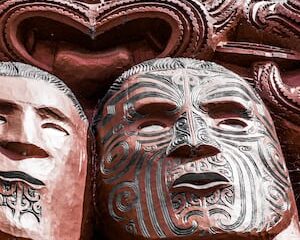Politics
Online Gambling Scams Target Māori with Fake Stories and Profiles

Online gambling sites are increasingly using fake identities and false success stories to attract Māori individuals, raising serious concerns about potential scams. Hapai te Hauora Māori Public Health has issued a warning to the public, urging vigilance as these fraudulent platforms exploit imagery and narratives that resonate with Māori culture.
The Chief Operating Officer of Hapai te Hauora, Jason Alexander, highlighted the troubling trend of scammers creating elaborate profiles that appropriate real images from whānau, assigning them fictitious names, and fabricating enticing success stories. “We’ve received numerous messages from individuals who have encountered these deceptive posts and deepfake videos endorsing gambling products,” Alexander noted. He emphasized the gravity of the situation, stating, “It’s really dangerous. Many of these profiles are clear scams, and we cannot determine whether they link to legitimate online casinos or are merely attempts to acquire personal credit card information.”
The tactics employed by these scammers are particularly concerning. Alexander pointed out that the fake posts often feature people with moko kauae, a traditional Māori facial tattoo, and leverage family connections to draw in vulnerable individuals. “If someone is at rock bottom, seeking an escape, they might see this as a potential lifeline, making them more susceptible to these scams,” he explained.
Hapai te Hauora is especially anxious about a recent government proposal to grant 15 licenses for online casinos. The organization advocates for stringent oversight to ensure that companies exhibiting fraudulent behavior do not receive these licenses. “We don’t believe that they will suddenly start acting ethically just because they obtain a license,” Alexander stated. He emphasized the need for greater awareness among whānau to prevent them from disclosing personal information to these fraudulent sites.
This warning follows actions taken by the Department of Internal Affairs (DIA) earlier this year, which included a crackdown on social media influencers promoting online gambling. In a related effort, the DIA recently cautioned ten university students regarding their promotion of overseas gambling websites on social media platforms.
As the prevalence of online gambling continues to rise, it is crucial for individuals, particularly within vulnerable communities, to remain informed and cautious. Hapai te Hauora is committed to educating the public about the risks associated with these scams and advocating for responsible gambling practices.
-

 World1 week ago
World1 week agoPrivate Funeral Held for Dean Field and His Three Children
-

 Top Stories2 weeks ago
Top Stories2 weeks agoFuneral Planned for Field Siblings After Tragic House Fire
-

 Sports3 months ago
Sports3 months agoNetball New Zealand Stands Down Dame Noeline Taurua for Series
-

 Entertainment3 months ago
Entertainment3 months agoTributes Pour In for Lachlan Rofe, Reality Star, Dead at 47
-

 Entertainment2 months ago
Entertainment2 months agoNew ‘Maverick’ Chaser Joins Beat the Chasers Season Finale
-

 Sports3 months ago
Sports3 months agoSilver Ferns Legend Laura Langman Criticizes Team’s Attitude
-

 Sports1 month ago
Sports1 month agoEli Katoa Rushed to Hospital After Sideline Incident During Match
-

 World2 weeks ago
World2 weeks agoInvestigation Underway in Tragic Sanson House Fire Involving Family
-

 Politics2 months ago
Politics2 months agoNetball NZ Calls for Respect Amid Dame Taurua’s Standoff
-

 Top Stories2 weeks ago
Top Stories2 weeks agoShock and Grief Follow Tragic Family Deaths in New Zealand
-

 Entertainment3 months ago
Entertainment3 months agoKhloe Kardashian Embraces Innovative Stem Cell Therapy in Mexico
-

 World4 months ago
World4 months agoPolice Arrest Multiple Individuals During Funeral for Zain Taikato-Fox





















